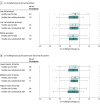Effect of Low-Fat vs Low-Carbohydrate Diet on 12-Month Weight Loss in Overweight Adults and the Association With Genotype Pattern or Insulin Secretion: The DIETFITS Randomized Clinical Trial
- PMID: 29466592
- PMCID: PMC5839290
- DOI: 10.1001/jama.2018.0245
Effect of Low-Fat vs Low-Carbohydrate Diet on 12-Month Weight Loss in Overweight Adults and the Association With Genotype Pattern or Insulin Secretion: The DIETFITS Randomized Clinical Trial
Erratum in
-
Units of Measure Error.JAMA. 2018 Apr 3;319(13):1386. doi: 10.1001/jama.2018.2977. JAMA. 2018. PMID: 29614160 Free PMC article. No abstract available.
-
Incorrect Funding/Support Section.JAMA. 2018 Apr 24;319(16):1728. doi: 10.1001/jama.2018.4854. JAMA. 2018. PMID: 29710144 Free PMC article. No abstract available.
Abstract
Importance: Dietary modification remains key to successful weight loss. Yet, no one dietary strategy is consistently superior to others for the general population. Previous research suggests genotype or insulin-glucose dynamics may modify the effects of diets.
Objective: To determine the effect of a healthy low-fat (HLF) diet vs a healthy low-carbohydrate (HLC) diet on weight change and if genotype pattern or insulin secretion are related to the dietary effects on weight loss.
Design, setting, and participants: The Diet Intervention Examining The Factors Interacting with Treatment Success (DIETFITS) randomized clinical trial included 609 adults aged 18 to 50 years without diabetes with a body mass index between 28 and 40. The trial enrollment was from January 29, 2013, through April 14, 2015; the date of final follow-up was May 16, 2016. Participants were randomized to the 12-month HLF or HLC diet. The study also tested whether 3 single-nucleotide polymorphism multilocus genotype responsiveness patterns or insulin secretion (INS-30; blood concentration of insulin 30 minutes after a glucose challenge) were associated with weight loss.
Interventions: Health educators delivered the behavior modification intervention to HLF (n = 305) and HLC (n = 304) participants via 22 diet-specific small group sessions administered over 12 months. The sessions focused on ways to achieve the lowest fat or carbohydrate intake that could be maintained long-term and emphasized diet quality.
Main outcomes and measures: Primary outcome was 12-month weight change and determination of whether there were significant interactions among diet type and genotype pattern, diet and insulin secretion, and diet and weight loss.
Results: Among 609 participants randomized (mean age, 40 [SD, 7] years; 57% women; mean body mass index, 33 [SD, 3]; 244 [40%] had a low-fat genotype; 180 [30%] had a low-carbohydrate genotype; mean baseline INS-30, 93 μIU/mL), 481 (79%) completed the trial. In the HLF vs HLC diets, respectively, the mean 12-month macronutrient distributions were 48% vs 30% for carbohydrates, 29% vs 45% for fat, and 21% vs 23% for protein. Weight change at 12 months was -5.3 kg for the HLF diet vs -6.0 kg for the HLC diet (mean between-group difference, 0.7 kg [95% CI, -0.2 to 1.6 kg]). There was no significant diet-genotype pattern interaction (P = .20) or diet-insulin secretion (INS-30) interaction (P = .47) with 12-month weight loss. There were 18 adverse events or serious adverse events that were evenly distributed across the 2 diet groups.
Conclusions and relevance: In this 12-month weight loss diet study, there was no significant difference in weight change between a healthy low-fat diet vs a healthy low-carbohydrate diet, and neither genotype pattern nor baseline insulin secretion was associated with the dietary effects on weight loss. In the context of these 2 common weight loss diet approaches, neither of the 2 hypothesized predisposing factors was helpful in identifying which diet was better for whom.
Trial registration: clinicaltrials.gov Identifier: NCT01826591.
Conflict of interest statement
Figures


Comment in
-
Blick in die Gene hilft nicht beim Abspecken.MMW Fortschr Med. 2018 Apr;160(7):38. doi: 10.1007/s15006-018-0429-9. MMW Fortschr Med. 2018. PMID: 29663210 German. No abstract available.
-
Low-Fat vs Low-Carbohydrate Diets and Weight Loss.JAMA. 2018 Jul 10;320(2):202. doi: 10.1001/jama.2018.6240. JAMA. 2018. PMID: 29998329 No abstract available.
-
Low-Fat vs Low-Carbohydrate Diets and Weight Loss.JAMA. 2018 Jul 10;320(2):202-203. doi: 10.1001/jama.2018.6244. JAMA. 2018. PMID: 29998330 No abstract available.
-
„Low carb“ ist definitiv keine Wunderdiät.MMW Fortschr Med. 2019 Mar;161(5):33. doi: 10.1007/s15006-019-0264-7. MMW Fortschr Med. 2019. PMID: 30887337 Review. German. No abstract available.
References
-
- Zylke JW, Bauchner H. The unrelenting challenge of obesity. JAMA. 2016;315(21):2277-2278. - PubMed
-
- Gardner CD, Kiazand A, Alhassan S, et al. Comparison of the Atkins, Zone, Ornish, and LEARN diets for change in weight and related risk factors among overweight premenopausal women: the A TO Z Weight Loss Study: a randomized trial. JAMA. 2007;297(9):969-977. - PubMed
-
- Shai I, Schwarzfuchs D, Henkin Y, et al. ; Dietary Intervention Randomized Controlled Trial (DIRECT) Group . Weight loss with a low-carbohydrate, Mediterranean, or low-fat diet. N Engl J Med. 2008;359(3):229-241. - PubMed
Publication types
MeSH terms
Substances
Associated data
Grants and funding
LinkOut - more resources
Full Text Sources
Other Literature Sources
Medical
Miscellaneous

